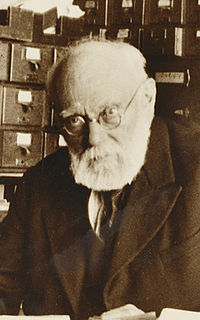Paul Otlet
| Paul Otlet | |
|---|---|
 |
|
| Born |
23 August 1868 Brussels, Belgium |
| Died | 10 December 1944 (aged 76) Brussels, Belgium |
| Nationality | Belgian |
| Fields | Information science |
| Institutions | Institut International de Bibliographie (now the International Federation for Information and Documentation) |
| Alma mater | |
| Known for | One of several people who have been considered the father of information science |
| Influences | Henri La Fontaine, Edmond Picard, Melvil Dewey |
| Influenced | Andries van Dam, Suzanne Briet, Douglas Engelbart, J.C.R. Licklider, Ted Nelson, Tim Berners-Lee, Vannevar Bush, Michael Buckland, Robert M. Hayes, Luciano Floridi, Frederick Kilgour, Alexander Ivanovich Mikhailov, S. R. Ranganathan, Gerald Salton, Jesse Shera, Warren Weaver |
Paul Marie Ghislain Otlet (/ɒtˈleɪ/; French: [ɔtle]; 23 August 1868 – 10 December 1944) was a Belgian author, entrepreneur, visionary, lawyer and peace activist; he is one of several people who have been considered the father of information science, a field he called "documentation". Otlet created the Universal Decimal Classification, one of the most prominent examples of faceted classification. Otlet was responsible for the widespread adoption in Europe of the standard American 3x5 inch index card used until recently in most library catalogs around the world (by now largely displaced by the advent of the online public access catalog (OPAC)). Otlet wrote numerous essays on how to collect and organize the world's knowledge, culminating in two books, the Traité de Documentation (1934) and Monde: Essai d'universalisme (1935).
In 1907, following a huge international conference, Otlet and Henri La Fontaine created the Central Office of International Associations, which was renamed to the Union of International Associations in 1910, and which is still located in Brussels. They also created a great international center called at first Palais Mondial (World Palace), later, the Mundaneum to house the collections and activities of their various organizations and institutes.
Otlet and La Fontaine were peace activists who endorsed the internationalist politics of the League of Nations and its International Institute of Intellectual Cooperation (the forerunner of UNESCO). Otlet and La Fontaine witnessed an unprecedented proliferation of information, resulting in the creation of new kinds of international organization. They saw in this organization an emerging global polity, and wished to help solidify it. La Fontaine won the Nobel Peace Prize in 1913.
...
Wikipedia
